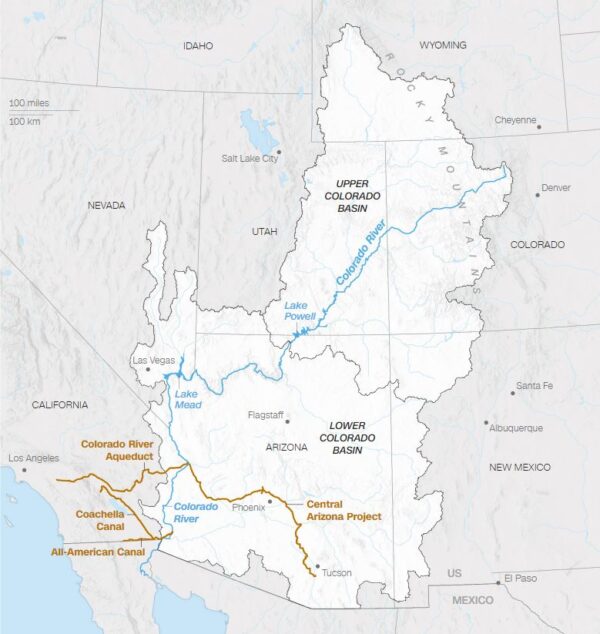Negotiations between the Colorado River’s seven basin states have stalled after months of talks on how to allocate water cuts.
Last year, the US Bureau of Reclamation told the states — Colorado, Utah, Wyoming, New Mexico, Arizona, Nevada and California — to figure out how to cut between 2 and 4 million acre-feet from their usage. For a river that was supposed to provide just 15 million acre-feet of water annually, for 40 million people, the call for cuts was substantial.
As it currently stands, however, the talks have shown a clear fault line: California versus everyone else.
Between the six states upstream of California, negotiations have proposed a model in which 3.1 million acre-feet could be saved annually. California was absent from the proposal — and expected to propose more modest cuts, around 1 million acre feet, sometime in early February.
Water usage on the Colorado River was first allocated by the Colorado River Compact, signed in 1922, which split the river’s 15 million acre-feet in half: half for the Upper Basin states (CO, WY, NM and UT) and half for the Lower Basin states (NV, AZ and CA). Later, in the 1940’s further agreements allocated the two halves by state and granted some water to Mexico.
This is how the river’s water is allocated today:
Colorado: 25.8%
Utah: 11.4%
Wyoming: 6.9%
New Mexico: 5.6%
Arizona: 19.0%
Nevada: 2.0%
California: 29.3%
Much of the contention during talks the last few months is disagreement between Arizona, which subordinated its rights to California in 1968 in exchange for building its Central Arizona Project, and California, which holds some of the highest-priority rights on the river. Inside California, the Imperial Irrigation District holds some of the most senior rights totaling some 3 million acre-feet, predating the 1922 Compact.
“We’re not going to give up a century of history and position and things that people worked for over a century to protect in two days,” said JB Hamby, the chair of the Colorado River Board for California. “Doing away with the priority approach is not something that’s acceptable.”
“I think California is playing with fire here,” said David Hayes of Stanford University Law School. “A 100-year-old agreement is not necessarily going to be around for another 100 years and the whole system could get blown up.”
Hayes also added that he fears that in the absence of some agreement with California, Reclamation could be forced to cut California’s water supply for shear lack of water, setting up possible future litigation.
Litigation could take years to resolve. “Plus, no legal decision will solve the fundamental problem of insufficient water,” Hayes continued. “The reality needs to be faced.”
– The Byway
Feature image caption: A map of the Colorado River Basin, including Wyoming, Utah, Colorado, Nevada, New Mexico, Arizona, and California. Courtesy Renee Rigdon/CNN.

